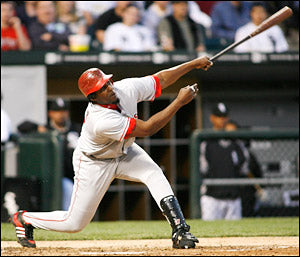Nobody likes losing. I am not advocating trying to lose or not competing to win. Wanting to win is important, competing to win is important, but actually winning at the youth level isn't as important. Last week, Giannis Antetokounmpo shared this excellent perspective on losing (below)
“Michael Jordan played 15 years, won 6 championships. The other 9 years were a failure?"
— NBA TV (@NBATV) April 27, 2023
Giannis on the Bucks 2022-2023 season pic.twitter.com/0l69MKazCF
There's a common belief in youth sports that winning is everything, and losing is nothing. But what if we told you that there is no such thing as losing? That every experience, regardless of the outcome, can be an opportunity for growth and learning? This is the old, often-used coaching cliche that "there's no such thing as losing, there's winning and there's learning." In this blog post, we'll explore this concept in detail and explain how it can help you achieve your goals and have a more fulfilling journey as a baseball or softball player.
Before we dive into the idea of "winning and learning," let's define what we mean by winning and losing. Winning is generally defined as achieving a goal, coming out on top in a competition, or being successful in some way. Losing, on the other hand, is the opposite of winning. It's failing to achieve a goal, coming up short in a competition, or experiencing some form of setback or disappointment. These definitions may seem straightforward, but they're not always so clear-cut in real life. For example, you might win a competition but not feel fulfilled by the experience, or you might lose a game but learn valuable lessons that help you in the long run.
So, what does it mean to say that there's no such thing as losing? It means that every experience, regardless of the outcome, can be an opportunity for growth and learning. When we focus solely on winning or losing, we miss out on the valuable insights and lessons that can come from both. Winning can teach us about our strengths and abilities, while losing can teach us about our weaknesses and areas for improvement. By embracing the idea that there's no such thing as losing, we can approach every experience with a growth mindset and use it as an opportunity to learn and improve.
Let's explore the concept of winning in more detail. Winning is often seen as the ultimate goal in our society. We're taught from a young age to strive for success, to be the best, and to win at all costs. Winning can certainly be a positive experience, and it can bring us a sense of pride, accomplishment, and recognition. However, it's important to remember that winning isn't everything. It's possible to win and still feel unfulfilled, or to focus so much on winning that we miss out on the other benefits of the experience.
For baseball players, your ultimate goal is to contribute value to helping your team win, but in the process of training, you might discover other benefits. You might enjoy the feeling of pushing yourself to new limits, the camaraderie of training with other players, or the opportunity to explore new movement solutions. These benefits are just as important as winning the game itself, and they can enrich your overall experience.
Now let's explore the concept of losing. Losing is often seen as a negative experience, something to be avoided at all costs. It can be painful, disappointing, and even humiliating. However, losing can also be a valuable learning experience. When we experience a setback or failure, we're forced to confront our weaknesses and shortcomings. This can be uncomfortable, but it can also be a powerful motivator for growth and improvement.
So, how do we embrace the idea that there's no such thing as losing and focus on winning and learning instead? Here are a few tips to get started:
-
Adopt a growth mindset: A growth mindset is the belief that our abilities and intelligence can be developed through hard work and dedication. When we have a growth mindset, we see challenges as opportunities to learn and grow, rather than obstacles to overcome. By adopting a growth mindset, we can approach every experience with a positive and open-minded attitude.
-
Focus on the process, not just the outcome: When we focus solely on winning, we can miss out on the other benefits of an experience. Instead, try to focus on the process of achieving your goal. What can you learn along the way? What new skills can you develop? By focusing on the process, you can enjoy the journey and derive more value from the experience, regardless of the outcome.
-
Celebrate small victories: While it's important to have big goals and aspirations, it's also important to celebrate small victories along the way. Recognizing and celebrating small achievements can give us a sense of progress and momentum, and can help us stay motivated and engaged.
-
Embrace failure as an opportunity for growth: Instead of fearing failure, try to see it as an opportunity to learn and grow. When we experience failure, we're forced to confront our weaknesses and identify areas for improvement. By embracing failure as an opportunity for growth, we can turn a negative experience into a positive one.
-
Keep learning and growing: Finally, remember that the learning never stops. Whether you win or lose, there's always something to be learned from the experience. Continuously seeking out new challenges and opportunities for growth can help you stay engaged and motivated, and can help you achieve your goals over the long term.
In conclusion, the idea that "there's no such thing as losing, there's winning and there's learning" can be a powerful mindset shift that can help us achieve our goals and live a more fulfilling journey as a player.
By embracing the idea that every experience can be an opportunity for growth and learning, we can approach challenges with a positive and open-minded attitude, celebrate small victories along the way, and continuously strive to learn and grow.
Whether you win or lose, remember that there's always something to be learned from the experience. So, keep striving, keep growing, and never stop learning.








